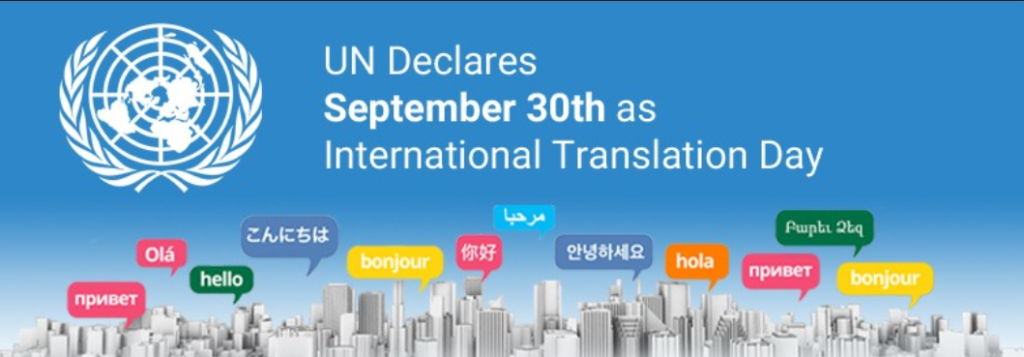Chapter proposals are invited for a volume entitled The Human Translator in the 2020s, to be edited by Gary Massey, David Katan and Elsa Huertas Barros.
The advance of machine translation (MT) into the routine cognitive work hitherto done by translators creates an increasing demand for post-editing and related technology-led skills, but it is also opening spaces for adaptive experts able to identify, deliver and advise on the added value of human translation and language service provision beyond the scope of automation. Driven by evolving digital resources and socio-ethical demands, the roles and responsibilities associated with the new and emerging profiles in the language industry are rapidly and comprehensively transcending the traditional bounds of core activities and competences prototypically associated with translation and interpreting. This volume will bring together a selection of research-based and practice-oriented perspectives on the subject, shedding light on the new and evolving roles, responsibilities and competences of the human translator in the 2020s.
A preliminary proposal for the volume has been reviewed internally and conditionally accepted for publication in the IATIS Yearbook series (Routledge) in 2022. The book will comprise eight to ten chapters, plus an introduction and conclusion. Each main chapter will contain approx. 6,000 words, including references. Chapter proposals will be reviewed by the editors. All chapters submitted at their invitation will be subject to a double-blind peer review.
Background
Digital transformation and demographic change are profoundly affecting the way our societies and economies function, confronting the translation profession with challenges, but also with opportunities. Accelerating technological developments, especially artificial intelligence, are reshaping the way translators work, changing processes, tasking and demand structures in the language industry. The advance of machine translation (MT) into the routine cognitive work hitherto done by human translators has been creating an increasing demand for MT post-editing and related technology-led skills, but it is also opening spaces for adaptive experts (Holyoak, 1991) able to identify, deliver and advise on the added value of human translation and language service provision beyond the scope of automation. Moreover, demographic developments and socio-ethical requirements to provide inclusive, user-centred access to information and services are extending the mediatory roles and responsibilities expected of human translators, supported by assistive technologies, in a growing variety of contexts.
A review of current job positions in the language industry demonstrates the proliferation of job titles and responsibilities (Bond, 2018). Powered by evolving digital resources and socio-ethical demands, the roles and responsibilities associated with these new and emerging profiles are rapidly and comprehensively transcending the traditional bounds of core activities and competences associated with translation and interpreting, the two key prototypes of language mediation. The diversity of activities, roles and responsibilities is also reflected in two handbooks published this year, the Bloomsbury Companion to Language Industry Studies (Angelone, Ehrensberger-Dow, and Massey 2020) and the Routledge Handbook of Translation and Technology (O’Hagan 2020). Localization, transcreation, multimodal and audiovisual translation, user-centred translation, accessible barrier-free communication, revision, pre-editing, post-editing, terminological services, linguistic intercultural mediation, public service translation, language and communication consultancy are just some of the
areas in which the professional group (still) called translators and interpreters work. As translation and related language mediation professions diversify, they are also increasingly converging with professions such as organisational, technical and accessible communication, yielding new interprofessional forms and fields of work oriented towards strategic trust- and reputation-building, user experience and social inclusion. Yet, research on translators’ status and self-concept indicates that they may be underequipped to embrace the changes, suggesting that competence profiles, role awareness and the education that shapes them should better accommodate the added value of adaptive human translation expertise to serve the broadening needs of a transitioning industry.
Target audience
The volume is intended to combine perspectives from research and practice, and should therefore appeal to actors from both spheres. Addressing an international readership, its primary audience consists of international translation studies scholars, intermediate to advance students of language mediation, and language mediator educators and their institutions, all of whom/which are identifiably affected by the increasingly rapid and widespread shifts taking place in the language industry in general, and the translation profession in particular. The secondary audience comprises professional practitioners and language managers working across the transitioning global language industry
Proposals
Chapter proposals are invited on relevant research, practice, theory and/or pedagogy related, but not limited, to
- Modes and forms of value-added human translation (e.g. inclusive/accessible and/or multilingual text design and production, transcreation, co-creation, intercultural mediation)
- (Re-)Positioning the human translator in complex sociotechnical environments and/or at the interface with assistive technologies
- Evolving translator roles and responsibilities
- New translator competences, profiles and/or their development
- New approaches to human translation in translator education
- New practices, workflows and/or (quality) processes centred on human translation
- Value-adding inter professional convergence and interfaces (e.g. with organisational communication, strategic communication, corporate communications, usability, technical communication, inclusive/accessible communication)
Proposals should contain an abstract of approx. 500 words (not including references) with a minimum of five references and be sent to gary.massey@zhaw.ch. The deadline for submission is 31 October 2020. Submitters will be informed about the acceptance of their proposals by
15 December 2020.
Publication schedule (provisional)
15 December 2020: Notification of acceptance of proposals.
15 April 2021: First drafts of chapters submitted to the editors.
30 April 2021: Chapters sent out for external review.
30 June 2021: Reviews returned to authors.
15 September 2021: Deadline for revised versions of the chapters.
30 September 2021: Revised versions sent out for second review (where appropriate).
31 October 2021: Second reviews returned to authors (where appropriate).
15 November 2021: Deadline for re-revised manuscripts (where appropriate).
15 December 2021: Final manuscript submitted in full to the publisher.
Editor contact details
1. Gary Massey, ZHAW Zurich University of Applied Sciences (Winterthur, Switzerland)
E-mail: gary.massey@zhaw.ch
Website: https://www.zhaw.ch/en/about-us/person/mssy
2. David Katan, University of Salento (Lecce, Italy),
E-mail: david.katan@unisalento.it
Website: https://www.unisalento.it/scheda-utente/-/people/david.katan
3. Elsa Huertas Barros, University of Westminster (London, United Kingdom)
E-mail: E.Huertasbarros@westminster.ac.ukwebsite: Website: https://www.westminster.ac.uk/about-us/our-people/directory/huertas-barros-elsa

